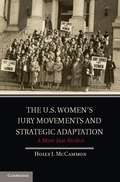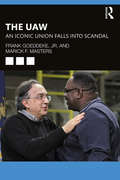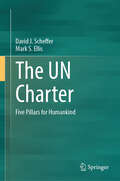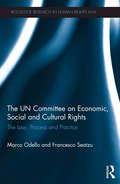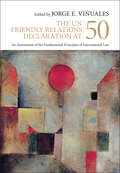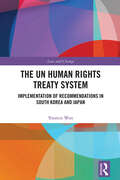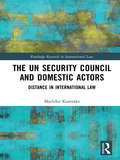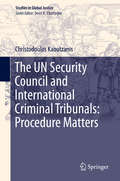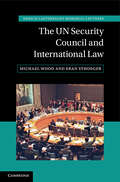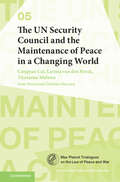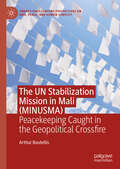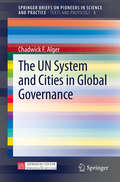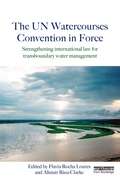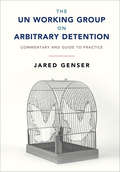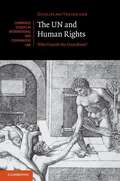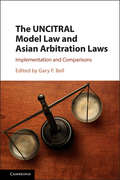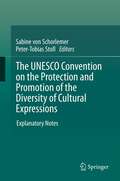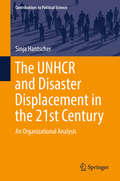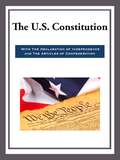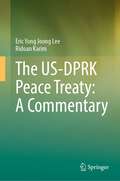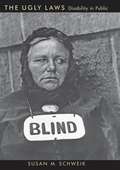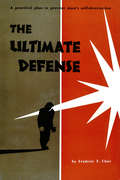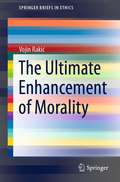- Table View
- List View
The U.S. Women'S Jury Movements and Strategic Adaptation
by Holly J. MccammonWhen women won the vote in the United States in 1920 they were still routinely barred from serving as jurors, but some began vigorous campaigns for a place in the jury box. This book tells the story of how women mobilized in fifteen states to change jury laws so that women could gain this additional right of citizenship. Some campaigns quickly succeeded; others took substantially longer. The book reveals that when women strategically adapted their tactics to the broader political environment, they were able to speed up the pace of jury reform, while less strategic movements took longer. A comparison of the more strategic women's jury movements with those that were less strategic shows that the former built coalitions with other women's groups, took advantage of political opportunities, had past experience in seeking legal reforms, and confronted tensions and even conflict within their ranks in ways that bolstered their action.
The UAW: An Iconic Union Falls into Scandal
by Marick F. Masters Frank Goeddeke, Jr.This book analyzes the multi-faceted scandal that has tarnished the reputation of the United Auto Workers (UAW), an iconic union revered for its commitment to union democracy and ethical practices, showing what went wrong to lead the spread of corruption and how to remedy it. Masters and Goedekke provide a historical context of the rise and decline of the UAW, leading to "a culture of corruption" and resulting in the indictment or conviction of 15 union and corporate officials for the misuse of tens of millions of dollars. The book evaluates the various proposed reforms of the UAW's financial practices and ethical standards, including the possibility of a government takeover. It raises questions about the wisdom of such a takeover, based on the problems associated with the government takeover of the Teamsters. The authors recommend that the UAW convene a special constitutional convention to consider reforms in governance and hiring practices. Providing a clear depiction of this scandal and the UAW’s systemic flaws, and suggesting potential remedies, this book will appeal to the tens of thousands of union officers and members keenly interested in the state of labor and an iconic union, their corporate counterparts in management, academics, students, and journalists in the fields of business and society, employee relations, law, labor relations, and management.
The UN Charter: Five Pillars for Humankind
by Mark S. Ellis David J. SchefferThis book reintroduces the U.N. Charter to the global audience by describing the Charter as the most important secular document in the world, for it is essentially the constitution of global governance to which all nations are bound, even if some honor it in the breach. The co-authors explain the core principles embedded in the Charter, which embodies codified customary international law for all nations. But the book also introduces pragmatic interpretations of key Charter provisions to modernize its application both today and in the future. Under the authority of the Charter, such U.N. bodies as the General Assembly, Security Council, Economic and Social Council, Human Rights Council, and International Court of Justice address global affairs in a tough neighborhood of 193 sovereign nations. Yet relatively few people are conversant with the principles set forth in the Charter. With moral principles under siege and with the reality of divisive politics in contemporary life, the Charter remains a beacon of global unity that offers a renewed sense of human progress in a turbulent world. The book explicates five core tenets of the U.N. Charter: human rights and fundamental freedoms, international law, economic and social progress, international peace and security, and peacemaking. The book will appeal to the academic audience and is written in a style that will engage the general reader as well. This is an extraordinary book. An excellent combination of history and future. It should definitely be used widely in educating present and coming generations about the importance of the UN and international law. It should also be read by representatives of UN member states, in particular of the P5 of the UN Security Council. It is unacceptable that all of them do not consequently perform as required by the UN Charter. (Hans Corell, Former Under-Secretary-General for Legal Affairs and the Legal Counsel of the United Nations) This is an authoritative, comprehensive and timely work on the occasion of the 80th anniversary of the UN Charter, by two leading experts in international human rights, humanitarian and criminal law. A must read.(The Honourable Irwin Cotler, P.C., O.C., O.Q., Ad.E.; former Minister of Justice and Attorney General of Canada; Founder & International Chair, Raoul Wallenberg Centre for Human Rights)
The UN Committee on Economic, Social and Cultural Rights: The Law, Process and Practice (Routledge Research In Human Rights Law Ser.)
by Marco Odello Francesco SeatzuThe book concerns the study and analysis of the UN Committee on Economic, Social and Cultural Rights from an international legal perspective, taking into consideration the adoption of the 2008 Optional Protocol to the International Covenant on Economic, Social and Cultural Rights (ICESCR).The volume provides a detailed account of the structure and functioning of the Committee on Economic, Social and Cultural Rights in the light of its jurisprudence, through a study of the Committee’s procedures and practices (periodic reports and general comments), including taking into account the Optional Protocol for individual complaint procedure. The book considers the possible implications of the work of this Committee on other UN Committees, such as the Human Rights Committee and the UN Committee on the Rights of the Child, as well as considering the repercussions of its work on the international protection of fundamental rights, such as the right to education, to health and adequate food.The UN Committee on Economic, Social and Cultural Rights will be of particular interest to academics and students of International and Human Rights law.
The UN Convention on Contracts for the International Sale of Goods: Theory and Practice
by Clayton P. Gillette Gillette, Clayton P. and Walt, Steven D. Steven D. WaltUpdated and expanded for the second edition, this volume provides attorneys, academics and students with a detailed yet accessible overview of the United Nations Convention on Contracts for the International Sale of Goods (CISG). Adopted by more than eighty nations and governing a significant portion of international sales, the CISG regulates contract formation, performance, risk of loss, conformity to contractual requirements and remedies for breach. This volume explains the CISG doctrines and their ambiguities, and appraises the extent to which the doctrines reduce transaction costs for commercial actors. Its topic-based approach will be ideal for those pursuing academic analysis or subject-specific research.
The UN Friendly Relations Declaration at 50: An Assessment of the Fundamental Principles of International Law
by Jorge E. ViñualesThe year 2020 marks the 75th anniversary of the United Nations Organisation, and the 50th anniversary of the United Nations Friendly Relations Declaration, which states the fundamental principles of the international legal order. In commemoration, some of the world's most prominent international law scholars from all continents have come together to offer a comprehensive study of the fundamental principles of international law. Each chapter in this volume reflects decades of experience, work and reflection by the most authoritative voices of the field. At the same time, the book is an invitation to end narrow specialisation and re-engage with the wider body of rules and processes that lie at the foundations of the international legal order.
The UN Human Rights Treaty System: Implementation of Recommendations in South Korea and Japan (Law and Change)
by Yoomin WonThrough a use of both qualitative and quantitative methodologies, Won provides a nuanced analysis and discussion of the factors and domestic processes influencing the implementation of United Nations Human Rights Committee (UNHRC) recommendations in South Korea and Japan, as well as across the globe.Won’s research entangles the theoretical debate on whether the UN human rights treaty system is effective in prompting the implementation of HRC recommendations. Based on interviews with activists, lawyers, scholars, judges, and other practitioners in South Korea and Japan, her findings reveal contrasting domestic dynamics: South Korea's vibrant institutional landscape enables more active implementation, while Japan's stable but centralized political system leads to more incremental change. In addition, Won creates a novel empirical dataset to assess the key variables associated with improvement in human rights action across 103 countries. The findings suggest that institutional mechanisms enhance implementation in new democracies, while civil society plays a crucial role even in authoritarian regimes. Ultimately, frequent and constructive dialogue between states, treaty bodies, and civil society, supported by institutional protections, is key to turning recommendations into human rights change.A unique empirical analysis of international human rights action as driven by UN recommendations, this book will be of interest to scholars and students of international law, human rights, and international relations, as well as human rights lawyers and the NGO Human Rights Communities.
The UN Security Council and Domestic Actors: Distance in international law (Routledge Research in International Law)
by Machiko KanetakeThis book analyses the exercise of authority by the UN Security Council and its subsidiary organs over individuals. The UN Security Council was created in 1945 as an outcome of World War II under the predominant assumption that it exercises its authority against states. Under this assumption, the UN Security Council and those individuals were ‘distanced’ by the presence of member states that intermediate between the Security Council’s international commands and those individuals that are subject to member states’ domestic law. However, in practice, the UN Security Council’s exercise of authority has incrementally removed the presence of state intermediaries and reduced the Security Council’s distance to individuals. This book demonstrates that this phenomenon has increased the relevance of domestic law in developing the international normative frameworks governing the UN Security Council and its subsidiary organs in safeguarding the rights, obligations, and interests of those affected individuals. This book presents how the UN Security Council’s exercise of authority has been received at the domestic level, and what would be the international implications of the Security Council’s extensive encounter with the actors who primarily reside in a domestic legal order.
The UN Security Council and International Criminal Tribunals: Procedure Matters (Studies in Global Justice #20)
by Christodoulos KaoutzanisThe book explains why and how the UN Security Council authorizes international criminal investigations into mass atrocities. In doing so, it tackles head-on the obvious double standards of global justice, where few atrocities get investigated and most slip below the headlines. The book argues that the Council’s decision-making procedure is central to understanding the Council’s decisions. This procedure is broken into three distinct steps, namely the role of diplomats at the Council, the Council’s reliance on third parties and the Council’s resort to precedent. The volume documents that the Council authorized international criminal investigations only into the handful of mass atrocities for which the Council’s deliberations successfully completed each of these three steps. Written for both scholars and practitioners, the book combines insights from the fields of international relations, international law and human rights. Through archival research and interviews with UNSC diplomats who took part in deliberations on atrocities, the volume presents evidence that supports its argument across cases and across time. In doing so, the book avoids the yes/no (or 0 vs 1) tendency of many social science projects, thereby acknowledging that there is no silver bullet to explain the work of the Council’s five permanent and ten elected members. Chris Kaoutzanis's Procedure Matters is a deep dive into how the UN Security Council actually works in dealing with some of the world's worst atrocities. Showing that UN procedure does matter, Kaoutzanis illuminates the limited accountability for international crimes that can be expected from that vital institution. As importantly, he offers a road map for how to use UN legitimating procedures to navigate the power politics of that august body. This is a map no scholar of international institutions and no human rights activist should be without. Michael Doyle, Columbia University This project recognizes what the scholarly literature has generally ignored or deemphasized: the central role of the Security Council in responding to mass atrocity situations. As much as international lawyers would hate to admit it, the legal response to international crimes is initially controlled not by international judges and tribunals, but rather by the Security Council and its geo-political and diplomatic complications. Kaoutzanis has put the sun back at the center of our solar system. Jens David Ohlin, Cornell Law School
The UN Security Council and International Law (Hersch Lauterpacht Memorial Lectures)
by Michael Wood Eran SthoegerThe UN Security Council and International Law explores the legal powers, limits and potential of the United Nations Security Council, offering a broadly positive (and positivist) account of the Council's work in practice. This book aims to answer questions such as 'when are Council decisions binding and on whom?', 'what legal constraints exist on Council decision making?' and 'how far is the Council bound by international law?'. Defining the controlling legal rules and differentiating between what the Council can do, as opposed to what it should do as a matter of policy, this book offers both a tool for assessment of the Council as well as realistic solutions to address its deficiencies, and, most importantly, evaluates its potential for maintaining international peace and security, to the benefit of us all.
The UN Security Council and the Maintenance of Peace in a Changing World (Max Planck Trialogues)
by Congyan Cai Larissa van den Herik Tiyanjana MaluwaHow can the UN Security Council contribute to the maintenance of international peace and security in times of heightened tensions, global polarisation, and contestation about the principles underlying the international legal and political order? In this Trialogue, experts with diverse geographic, socio-legal, and ideational backgrounds present their perspectives on the Security Council's historic development, its present functions and deficits, and its defining tensions and future trajectories. Three approaches engage with each other: a power-focused approach emphasising the role of China as an emerging actor; an institutionalist perspective exploring how less powerful states, particularly the elected members of the Security Council, exert influence and may strengthen rule-of-law standards; a regionalist perspective investigating how the Security Council as the central actor can cooperate with regional organisations towards maintaining international peace and security. This title is also available as Open Access on Cambridge Core.
The UN Stabilization Mission in Mali: Peacekeeping Caught in the Geopolitical Crossfire (Twenty-first Century Perspectives on War, Peace, and Human Conflict)
by Arthur BoutellisThe book tells (and analyzes) the story of the United Nations multidimensional stabilization operation in Mali (MINUSMA), which closed at the end of the 2023 after almost a decade of existence. MINUSMA, which is the UN operation that has by far attracted the most media attention, has been the laboratory of contemporary peacekeeping, combining several interesting elements. It came on the tail of a French-African military intervention (rehatting African contingents), operated ‘in parallel’ to various counterterrorism forces (Barkhane and JF G5 Sahel). It has been the deadliest peace operation due to asymmetric threats but has also managed to adapt to a new environment and has witnessed a ‘return’ of European troop contributors to peacekeeping in Africa but also a significant contribution from China. Most importantly, MINUSMA ultimately became caught in the geopolitical crossfire, with a host government led by a military junta and supported by Russia (and the Wagner Group) defying the Security Council, in the context of a return of East-West rivalries exacerbated by the 2022 Ukraine invasion.
The UN System and Cities in Global Governance
by Chadwick F. AlgerThis is the second volume to commemorate the 90th birthday of the distinguished scholar Chadwick F. Alger to honor his lifetime achievement in international relations and as President of the International Studies Association (1978-1979). After a brief introduction by Chad F. Alger this volume presents six of his key texts on The UN System and Cities in Global Governance, focusing on "Cities as arenas for participatory learning in global citizenship"; "The Impact of Cities on International Systems"; "Perceiving, Analysing and Coping With the Local-Global Nexus"; "The World Relations of Cities: Closing the Gap Between Social Science Paradigms and Everyday Human Experience"; "Japanese Municipal International Exchange and Cooperation in the Asia-Pacific: Opportunities and Challenges" and on "Searching for Democratic Potential in Emerging Global Governance: What Are the Implications of Regional and Global Involvements of Local Governments?".
The UN Watercourses Convention in Force: Strengthening International Law for Transboundary Water Management
by Alistair Rieu-Clarke Flavia Rocha LouresAt the UN General Assembly in 1997, an overwhelming majority of States voted for the adoption of the United Nations Convention on the Law of the Non-Navigational Uses of International Watercourses – a global overarching framework governing the rights and duties of States sharing freshwater systems. Globally, there are 263 internationally shared watersheds, which drain the territories of 145 countries and represent more than forty percent of the Earth's land surface. Hence, inter-State cooperation towards the sustainable management of transboundary water supplies, in accordance with applicable international legal instruments, is a topic of crucial importance, especially in the context of the current global water crisis. This volume provides an assessment of the role and relevance of the UN Watercourses Convention and describes and evaluates its entry into force as a key component of transboundary water governance. To date, the Convention still requires further contracting States before it can enter into force. The authors describe the drafting and negotiation of the Convention and its relationship to other multilateral environmental agreements. A series of case studies assess the role of the Convention at various levels: regional (European Union, East Africa, West Africa, Central Asia, Central America and South America), river basin (e.g. the Mekong and Congo) and national (e.g. Ethiopia and Mexico). The book concludes by proposing how future implementation might further strengthen international cooperation in the management of water resources, to promote biodiversity conservation as well as sustainable and equitable use.
The UN Working Group on Arbitrary Detention: Commentary and Guide to Practice
by Jared GenserThe United Nations Working Group on Arbitrary Detention is the first comprehensive review of the contributions of this important institution to understanding arbitrary detention today. The Working Group is a body of five independent human rights experts that considers individual complaints of arbitrary detention, adopting legal opinions as to whether a detention is compatible with states' obligations under international law. Since its establishment in 1991, it has adopted more than 1,200 case opinions and conducted more than fifty country missions. But much more than a jurisprudential review, these cases are presented in the book in the style of a treatise, where the widest array of issues on arbitrary detention are placed in the context of the requirements of multilateral treaties and other relevant international standards. Written for both practitioners and serious scholars alike, this book includes five case studies and a foreword by Archbishop Desmond M. Tutu.
The UN and Human Rights
by Guglielmo VerdirameThrough an analysis of UN operations including international territorial administration, refugee camps, peacekeeping, the implementation of sanctions and the provision of humanitarian aid, Guglielmo Verdirame shows that the powers exercised by the UN carry a serious risk of human rights abuse. The International Law Commission has codified and developed the law of institutional responsibility, but, while indispensable, these principles and rules cannot on their own ensure compliance and accountability. The 'liberty deficit' of the UN and of other international organisations, thus remains an urgent legal and political problem. Some solutions may be available; indeed, recent state and institutional practice offers interesting examples in this respect. But at a fundamental level we need to ask ourselves whether, judged on the basis of the principle of liberty, the power shift from states to international organisations is always beneficial.
The UNCITRAL Model Law and Asian Arbitration Laws: Implementation and Comparisons
by Gary F. BellIn the Asia-Pacific, thirty-eight jurisdictions have adopted the UNCITRAL Model Law on International Commercial Arbitration. This book looks at how the text and the principles of the Model Law have been implemented (or not) in key Asian jurisdictions. Most of the jurisdictions covered in this book have declared that they have adopted the Model Law but often with significant modifications. Even when jurisdictions adopt some provisions of the Model Law verbatim, their courts may have interpreted these provisions in a manner inconsistent with their goals and with how they are interpreted internationally. When a jurisdiction has not adopted the Model Law, the chapter compares its legislation to the Model Law to determine whether it is consistent with its principles. Each chapter follows the structure of the Model Law allowing the reader to easily compare the arbitration laws of different jurisdictions on each topic.
The UNESCO Convention on the Protection and Promotion of the Diversity of Cultural Expressions
by Sabine Von Schorlemer Peter-Tobias StollThe 2005 UNESCO Convention on Cultural Diversity is a landmark agreement in modern international law of culture. It reflects the diverse and pluralist understanding of culture, as well as its growing commercial dimension. Thirty diplomats, practitioners and academics explain and assess this important agreement in a commentary style. Article by article, the evolution, concepts, contents and implications of the Convention are analysed in depth and are complemented by valuable recommendations for implementation. In an unprecedented way, the book draws on the first-hand insights of negotiators and on the experience of practitioners in implementation, including international cooperation, and combines this with a good deal of critical academic reflection. It is a valuable guide for those who deal with the Convention and its implementation in governments, diplomacy, international organizations, cultural institutions and non-governmental organizations and will also serve as an important resource for academic work in such fields as international law and international relations.
The UNHCR and Disaster Displacement in the 21st Century: An Organizational Analysis (Contributions to Political Science)
by Sinja HantscherThis book offers an in-depth case study on the leading international refugee agency, the United Nations High Commissioner for Refugees (UNHCR), and its approach to environmentally displaced persons. The author examines the UNHCR on the basis of expert interviews and content analysis in order to highlight why and how the organization is addressing the issue. The analysis draws on organizational as well as security theory, offering readers a better understanding of the connection between the two. The book appeals to scholars in the fields of migration and organizational studies, as well as policymakers and professionals working in international organizations.
The UNHCR and the Supervision of International Refugee Law
by James C. SimeonThe 1951 Convention relating to the Status of Refugees, and its 1967 Protocol, and many other important international instruments recognize the unique role the UNHCR plays in protecting refugees and supervising international refugee law. This in-depth analysis of the UNHCR's supervisory role in the international refugee protection regime examines the part played by key institutions, organizations and actors in the supervision of international refugee law. It provides suggestions and recommendations on how the UNHCR's supervisory role can be strengthened to ensure greater State Parties' compliance to their obligations under these international refugee rights treaties, and contributes to enhancing the international protection of refugees and to the promotion of a democratic global governance of the international refugee protection regime.
The US Constitution with the Declaration of Independence and the Articles of Confede
by VariousThe most important documents of the United States of America are collected in this easy-to-read volume, which includes the Constitution of the United States of America, with all of the Amendments; The Declaration of Independence; the Articles of Confederation, and an appendix containing a list of the states by date of admission to the Union. Every citizen of the United States, student of history anywhere in the world, or anyone interested in understanding who we are as a nation should have and study a copy of these works.
The US-DPRK Peace Treaty: A Commentary
by Eric Yong Lee Ridoan KarimThis book delivers an in-depth analysis of the US-DPRK Peace Treaty which will be concluded as a final result of the Korean Peninsula peace process that is currently ongoing. Since North Korea launched its nuclear weapons development program in the early 1990s, the Korean peninsula has become a critical point of global politics along with the Sino-American (G2) hegemonic competition. The US-DPRK Peace Treaty is the key to the denuclearization and de jure peace on the peninsula as well as Northeast Asia. Different from the comprehensive peace treaty between the four parties (US, China, and the two Koreas) already proposed for the past few years, the book suggests a ‘bilateral’ approach to the agreement between the US and the DPRK, which will trigger the peace as a system considering the US’s practices in this regard after 1783. Such a challenging and provocative method provides deeper understanding of the legal and political circumstances for the expected US-DPRK Peace Treaty. The book will navigate scholars, practitioners, and students towards terminating the 1953 Armistice, establishing nuclear peace as well as a rapprochement between the two countries. In practice, it will be a useful guideline for the conflicting parties in the various parts of the globe to adopt peace treaties in the twenty-first century.
The Ugly Laws: Disability in Public
by Susan SchweikIn 1881, the Chicago City Code read, "Any person who is diseased, maimed, mutilated, or in any way deformed... shall not... expose himself to public view." These "ugly laws" began in San Francisco in 1867, then spread through the U.S. and abroad; many in the U.S. weren't repealed until the 1970s. English professor Schweik (A Gulf So Deeply Cut: American Women Poets and the Second World War), co-director of UC Berkley's disabilities studies program, explores the emergence of these laws and their tragic consequences for thousands. Motivated largely by the desire to reduce beggar populations and to expand the role of charitable organizations, in practical terms the ugly laws meant "harsh policing; anti-begging; systematized suspicion...; and structural and institutional repulsion of disabled people." Schweik discusses the nineteenth-century conditions that created a demand for these laws, but notes how the resulting practices have carried through to the present. Schweik draws on a deep index of resources, from legal proceedings to out-of-print books, to tell the story of individuals long lost to history. Her detailed analysis will be of primary interest to those involved with the history of social justice in the U.S. and the passage of the Americans with Disabilities Act. 18 Illus. Copyright Reed Business Information, a division of Reed Elsevier Inc. All rights reserved.
The Ultimate Defense: A Practical Plan to Prevent Man's Self-Destructio
by Fredric F. ClairThe utter extinction fo mankind by atomic warfare is a horrifying possibility-if not a probability-whether we face it or not. The Ultimate Defense diagnoses this most crucial problem of our generation and presents a practical plan for solving it.The ethical, pan-humanistic presentation of the author not only reveals a logical plan but also a specific plan. Through its strong personal effect upon the reader, each individual becomes aware of his responsibility for the situation and why it is necessary for him to contribute to its solution.Ringing with sincerity, the author's message extracts the very essence, the basic moral core that units all religions and reveals the identical ethics at the heart of all of them.This is no theoretical treatise on ethics, nor does it advocate any cult or creed. Based on a study of comparative religion, it brings into common focus, with burning brightness, the rays of light that emanate from all religions. The result is a central core of truth that shows not only how to prevent annihilation, but even more important, HOW TO LIVE.
The Ultimate Enhancement of Morality (SpringerBriefs in Ethics)
by Vojin RakićThis book deals with good, evil, happiness and morally enhanced post-humans. It offers a succinct historical elaboration of philosophical stances towards morality and happiness, focusing on Kant's ideas in particular. Human augmented ethical maturity in a futuristic version of Kant’s Ethical Commonwealth implies, among else, voluntary moral bio-enhancement (VMBE); consequently, more happiness – as morality and happiness are in a circularly supportive relationship; ultimate morality (UM). UM is in its own way a universal morality. In line with the contention that Kant’s vision of the (not immediate but more distant) future of humanity is one of a cosmopolitan moral order in which humans act virtuously in the broadest possible community, that is, humanity, it is justified to conclude that successful VMBE is conducive to Kant’s vision. In this context the book is of great interest to a broad audience, such as those interested in VMBE and novel conceptions of morality, and those with an interest in the historical development of morality and happiness, in philosophy (specifically, ethics) and in post-humanity.
